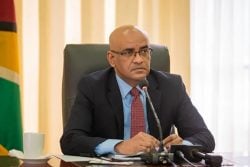Dear Editor,
Who was it that said: “I cannot hear what you are saying, for what you are deafens me”? Probably in anticipation of the current (pandemic) environment which accommodates free speech – to the point of recklessness! A Caribbean version of the foregoing goes like this: “You talk a lot, but you don’t mek no speech”. Intricated in both these versions is the evaluation of the audience being addressed; and in turn who that audience interprets the speaker to be. So that more than the simplicity of the (right) words used, is the credibility of the messenger’s character, as well as the reputation of the group to which the latter is connected. But the foregoing portrayal of ‘communication’ is now overcome by the confusion defined as ‘social’ media, which incites negative, even hostile, interactions amongst speakers, listeners, players and witnesses – perhaps the only, though unhappy, platform of ‘equality’.
Elsewhere, face-to-face, masked decision-makers speak to: a) communities whose residents take care not to cover their ears, while ensuring they say nothing; for they realise that no conversation is intended between the speaker standing above and them sitting below – an arrangement hardly intended to solicit views, on the presumption that the latter do not know, and certainly not better. b) But when it comes to the ‘media’, it is not as if all types and persuasions are invited to listen and then inquire as ‘equals’. The interaction has become more of an obeisant exchange, or else that ‘medium’ would be deemed ‘off-line’, and forced into an ‘on-line’ retreat from which he/she can be anonymously assertive.
Where then is the ‘socialisation’? How do we engage one another more than just ‘pro’ and ‘con’? When will we extend invitations to share one another’s thoughts, feelings, fears, anticipations, and finally arrive at agreement (if only to disagree)? In other words, when will we reconcile to the reality that neither one nor the other can insist on winning every round, but that even champions have to settle for a draw? Journalists of any kind must stand up to be counted, moreso as representatives of their colleagues, and of those citizens who have little opportunity to listen directly, and/or to respond as our constitution allows. In the alleged construct of ‘One Guyana’ the marriage should not be between the ‘better’ and ‘lesser’ halves, but that of spirited, and spiritual, human beings – one of whom may well be president of the Guyana Press Association. Where is manhood found in the ‘better half’? When therefore will we commit to listening to one another – in the spirit of ‘give and take’? When will we set the right (social) examples for future generations to emulate? At this precarious point in time, should we not consider committing to a signed pact for ‘equal’ communication – unmasked and ‘in-line’, albeit too localised – with minimal reference to any other language, culture, or history of better performers?
Sincerely,
E.B. John
Information Officer
Government Information Services
1957 – 58






